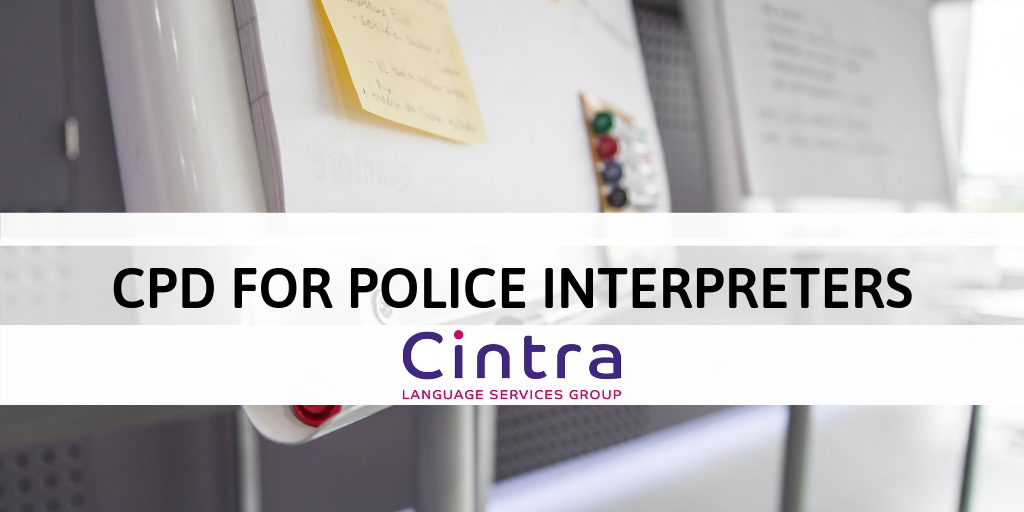How do I become a Police Interpreter?
 It was years ago when an old colleague asked me what I planned for my future. Surprised by his question and knowing that he was passionate about computers I said I liked the English language. He laughed saying, “I could make a future for myself with my computer – what future could you make with your English?” That was more than 20 years ago, back in my native country.
It was years ago when an old colleague asked me what I planned for my future. Surprised by his question and knowing that he was passionate about computers I said I liked the English language. He laughed saying, “I could make a future for myself with my computer – what future could you make with your English?” That was more than 20 years ago, back in my native country.
I eventually made the decision to live in the UK and have been settled here for the past 13 years. During that time I have made a lot of English friends who visited my country for my wedding, where I acted as their interpreter. I felt important; I was their communication bridge.
It was then I realized that being fluent in English was not enough. It was difficult to process quickly in my head the English language into my native language and vice versa. Although I thought I had “good English”, that seemed not to be sufficient. I had a passion for the language and I had to find a way to improve my abilities.
The experience at my wedding gave me food for thought so I started looking into interpreting courses. Cintra was suggested to me by a police officer, who was an old friend of mine and worked with qualified interpreters from that company. Interpreting for the Police sounded rather interesting.
Therefore I contacted Cintra and soon I started a Diploma in Police Interpreting course with them. At the course I met people from several different cultures and countries – this expanded my view of the world. Our Tutor was a very experienced Interpreter and she had so much to tell about her work.
Police Interpreters need to have the necessary knowledge to do their job well and the DPI course played an important part in helping me gain this knowledge. The course introduced to me to English Law, interpreting and translating techniques and many other important topics. I learnt how a professional interpreter should behave and also how to deal with tricky situations.
After passing my assessment with Cintra and then later the DPI exam I started taking assignments at Police Stations. At the beginning I was quite nervous. When I received my first job confirmation I was given a brief description of the offence so I could quickly refresh myself about the topic before I arrived at the Station. To aid me I took with me a printout of the Police Caution in my own language so I wouldn’t stumble at the beginning of the Police Interview. The Caution is an important legal phrase that should be clearly communicated to anyone being questioned who is suspected of committing a crime. Thanks to Cintra I now have more than 3 years’ experience in Police Interpreting and I can say the Police Caution and imagine my daughter blowing me kisses at the same time. I have much more confidence now than at the start of my career and I love every minute of my job.
Each assignment is unique; challenging the interpreter’s linguistic skills all the time and that is why I enjoy hugely what I do. One day I could be interpreting for someone who stole a fragrance from a shop and another day for someone who committed a fraud at a bank. I do not consider one less important than the other. I am always learning from the Police Officers, from the solicitors and even from the offenders. This is the reality of life as an interpreter that, although rarely written about in books, sometimes comes out in the newspapers.
I thank Cintra for looking after me and being there day and night at the other end of the phone line. I rang them at 2am the other night to ask for their advice and I know I can do this at any time – the staff are well trained and supportive. It’s always a pleasure to meet them at the next professional practice workshop or at the AGM.
Less than a month ago my old colleague I mentioned at the beginning of this article found me on Facebook and asked me about my job in the UK. I said I was a successful Interpreter, thanks to my passion for the English language.
Want to follow in Cristian’s footsteps?
If you’re interested in training to become an interpreter, visit http://cintra.org.uk/page/training-courses. Cintra’s next Diploma in Police Interpreting course starts in October 2017 in Warwick and we’d love to hear from you. You can also sign up for news of future courses.
Already have an interpreting/translation qualification or experience and seeking work?
As well as running interpreter training courses Cintra has many opportunities for freelance interpreting and translation work across England particularly in the Midlands and East Anglia. Visit http://cintra.org.uk/page/work-with-us to find out more.





Leave a Reply
You must be logged in to post a comment.